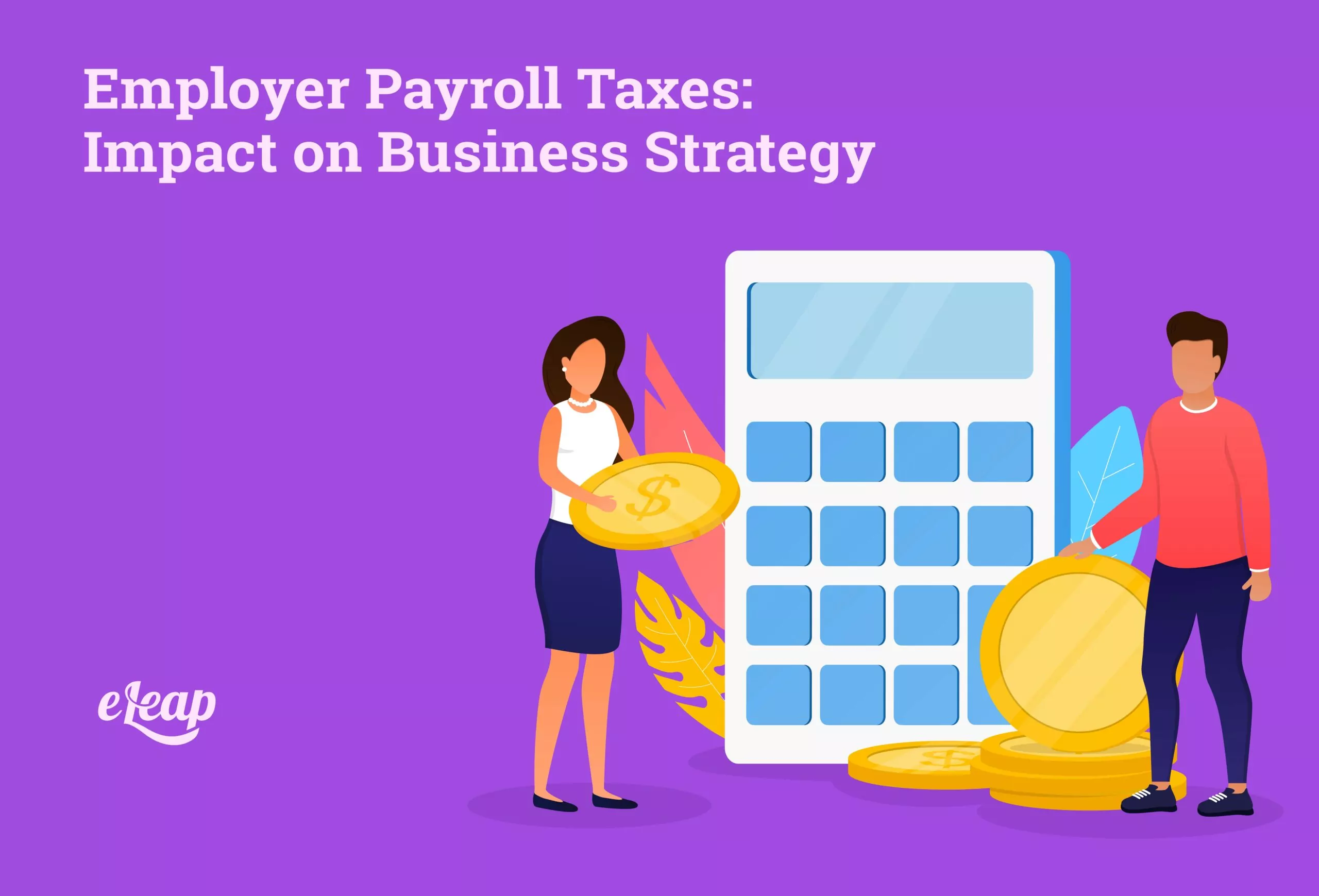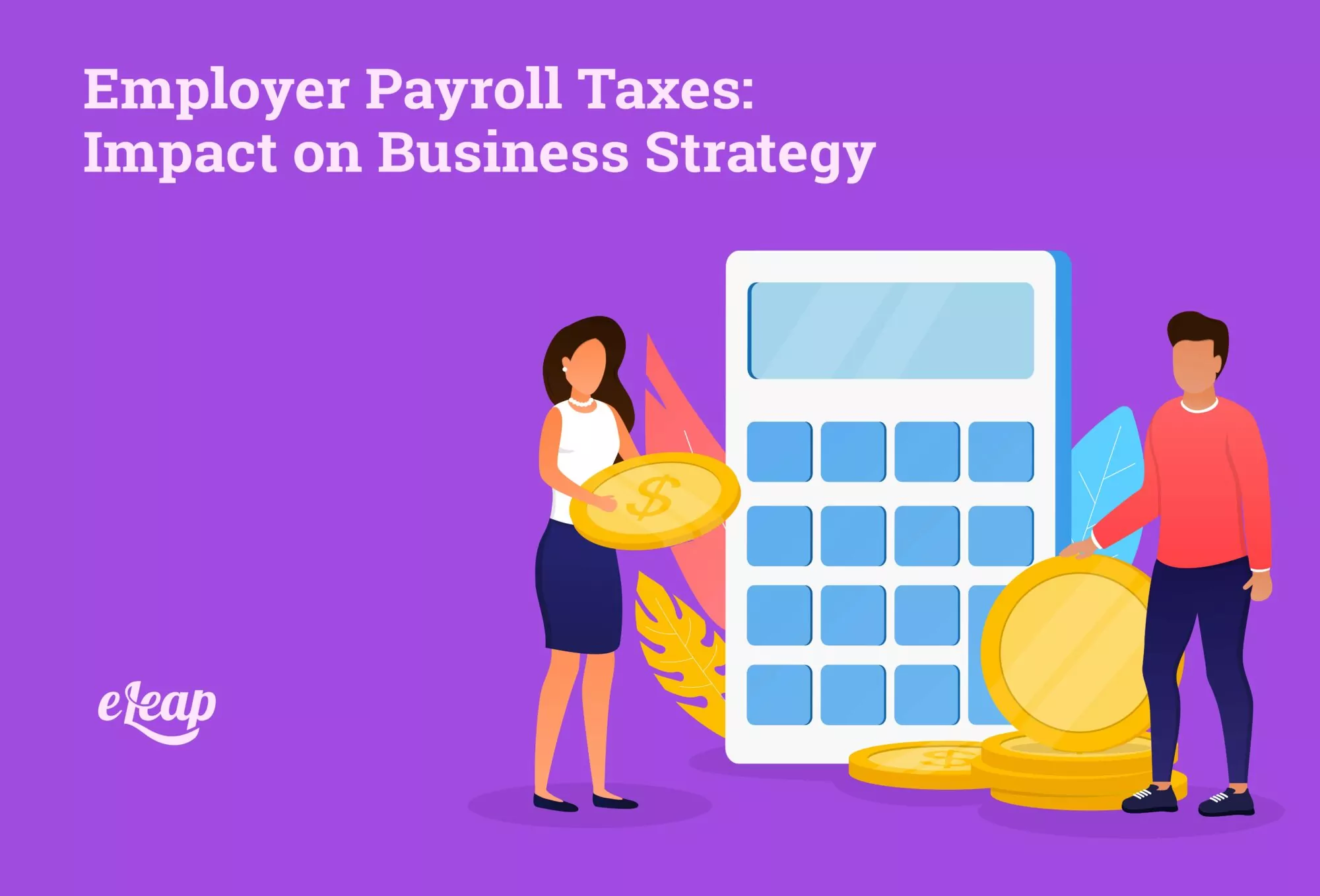Employer Payroll Taxes: Impact on Business Strategy

Employer payroll taxes represent a significant financial obligation for businesses of all sizes. These mandatory taxes directly impact your bottom line and influence key business strategies. Employer payroll taxes aren’t just an administrative hurdle but a critical part of your overall business strategy. Understanding them is essential for compliance, financial planning, and long-term growth. This article explores how employer payroll taxes affect your business decisions and offers strategic approaches to manage these obligations effectively. Explore how eLeaP®’s Performance Management Platform can simplify evaluations, boost productivity, and drive measurable results.
Types of Employer Payroll Taxes
Federal Employer Payroll Taxes
The federal government requires several employer payroll taxes:
- Income Tax Withholding: Employers must withhold federal income tax from employees’ wages based on their W-4 form. These amounts vary depending on factors like marital status and number of dependents.
- Social Security and Medicare (FICA): Employers must match employees’ contributions—6.2% for Social Security (up to the wage base limit) and 1.45% for Medicare (with no wage limit).
- Federal Unemployment Tax (FUTA): Currently, it is 6.0% on the first $7,000 of each employee’s wages, though most employers receive a credit reducing this to 0.6% if they meet state unemployment requirements.
State Employer Payroll Taxes
Most states impose additional employer payroll taxes:
- State Income Tax: Most states have income tax requirements that vary by location. Employers are responsible for withholding these taxes from employee wages and remitting them to the appropriate state tax agency.
- State Unemployment Insurance (SUI): Similar to FUTA at the federal level, these taxes fund state unemployment insurance programs. Each state has its own rules for tax rates and wage base limits.
- State disability insurance: Required in some states
- Various workforce development taxes and other state-specific employer payroll taxes
Local Employer Payroll Taxes
Some localities levy additional employer payroll taxes:
- City income taxes
- County taxes
- Special district assessments
Understanding these various employer payroll taxes is crucial for accurate budgeting and compliance.
Financial Impact of Employer Payroll Taxes
Direct Cost Assessment

Employer payroll taxes typically add 7.65% to 15% or more to your total payroll costs, depending on your location and specific circumstances. For many businesses, these employer payroll taxes represent one of the most significant expense categories after direct wages.
For example:
- If you pay an employee $50,000 annually, you will pay approximately $7,650 for Social Security and Medicare taxes alone, on top of their wages
- Additionally, you’ll be responsible for federal and state unemployment taxes
Cash Flow Considerations
The timing of employer payroll tax deposits affects your cash flow management. Federal employer payroll taxes must typically be deposited:
- Monthly for smaller employers
- Semiweekly for larger employers
- The next day, for huge tax liabilities
Mismanaging these deposit schedules can result in penalties, creating additional costs beyond the employer payroll taxes. Maintaining a solid cash flow management system is key to ensuring employer payroll taxes don’t strain your business finances.
Budget Planning
Effective budget planning must account for all employer payroll taxes. Many businesses face challenges when they fail to correctly forecast these expenses, particularly:
- Seasonal businesses with fluctuating payrolls
- Growing companies are adding new employees
- Businesses operating in multiple tax jurisdictions
Proactive employer payroll tax planning allows you to allocate funds for tax payments without disrupting your cash flow or business operations. Forecasting and incorporating tax liabilities into your annual business budget is essential for direct costs (employee tax withholdings) and employer-paid portions (Social Security, Medicare).
Strategic Business Decisions Influenced by EmployerPayroll Taxes
Hiring Decisions
Employer payroll taxes significantly impact hiring strategies:
- Full-time vs. part-time employees
- Considering overtime vs. additional hires
- Geographic hiring decisions based on regional employer payroll tax differences
As employer payroll tax obligations increase with new employees or expansion into new states, business owners must factor in these costs when making decisions about scaling operations. Before making hiring decisions, ensure you understand the cost of hiring new employees, including payroll taxes.
Compensation Structures
Many businesses structure compensation to optimize employer payroll tax obligations:
- Bonus timing strategies
- Deferred compensation arrangements
- Benefits packages (non-taxable benefits vs. direct compensation)
A thoughtful compensation strategy that includes understanding employer payroll taxes can benefit employees and employers. Offering benefits like health insurance or retirement plans may provide tax advantages for both parties while attracting top talent.
Employee Classification Decisions
The distinction between employees and independent contractors dramatically affects employer payroll tax responsibilities:
- Employees trigger employer payroll taxes
- Independent contractors handle their self-employment taxes
- Misclassification can lead to substantial back taxes and penalties
Misclassifying workers is one of the most significant mistakes employers can make. The IRS requires businesses to distinguish between employees and independent contractors, as they are subject to different tax rules. This error can result in costly back taxes, penalties, and potential legal issues.
Tax Planning Strategies
Legal Tax Reduction Methods
Several strategies can legally reduce employer payroll tax burdens:
- Small Business Health Care Tax Credit: Eligible employers can offset employer payroll taxes
- Work Opportunity Tax Credit (WOTC): Tax incentives for hiring from certain target groups, including veterans and individuals from economically disadvantaged backgrounds
- Research and Development (R&D) Tax Credit: Businesses engaged in qualified research can apply for this credit to offset payroll tax costs
- FICA tip credit: For businesses in the food and beverage industry
Timing Considerations
Strategic timing can optimize employer payroll tax management:
- Year-end bonuses vs. new year bonuses
- Tax rate changes and implementation dates
- Quarterly tax planning reviews
Tax Credits and Incentives
Many jurisdiction-specific programs offer employer payroll tax incentives:
- Enterprise zones and opportunity zones
- Industry-specific tax incentives
- Economic development programs
Compliance and Risk Management
Penalties for Non-compliance
Failure to properly handle employer payroll taxes leads to significant penalties:
- Late deposit penalties (2% to 15% of unpaid taxes)
- Failure to file penalties
- Trust fund recovery penalties (personal liability for responsible parties)
Non-compliance with employer payroll taxes can result in significant fines, interest on unpaid taxes, and even legal action. To avoid these consequences, businesses must stay current on payroll tax filings, withholdings, and payment schedules.
Record-keeping Requirements
Proper documentation is essential for employer payroll tax compliance:
- Employee information records
- Tax deposit receipts
- Quarterly and annual tax returns
- Supporting documentation for tax credits claimed
- Records of tips, bonuses, and other additional earnings
Employers often overlook correctly tracking tips, bonuses, and other supplemental earnings. These must be included in employer payroll tax calculations, and failing to do so can lead to IRS audits and penalties.
Compliance Technology Solutions
Tax compliance can be time-consuming, but with payroll software and automation, businesses can streamline the entire employer payroll tax process. Automated systems:
- Ensure tax rates are updated according to federal, state, and local requirements
- Offer reminders for tax deadlines
- Minimize errors and omissions, reducing the risk of penalties
By adopting automated payroll systems, you can focus more on growing your business rather than getting bogged down in administrative tasks related to employer payroll taxes.
Outsourcing vs. In-House Management
Another option is outsourcing employer payroll tax management to a third-party provider. Companies like ADP, Gusto, and Paychex offer payroll services that handle tax filing, employee deductions, and compliance. Outsourcing allows you to focus on your core business functions while experts manage the complexity of employer payroll taxes.
Audit Preparation
Preparing for potential employer payroll tax audits includes:
- Regular internal reviews of employer payroll tax calculations
- Documentation of tax positions taken
- Clear audit trails for all employer payroll tax decisions
Proper documentation of your employer’s payroll tax practices will be crucial for demonstrating compliance and avoiding penalties when facing an audit.
Common Employer Payroll Taxes Pitfalls and How to Avoid Them
Misclassifying Workers
As mentioned, worker misclassification is a serious error with employer payroll taxes. Thoroughly review each working relationship to ensure proper classification as either an employee or an independent contractor.
Missing State-Specific Requirements
With each state having its own employer payroll tax rules, it’s crucial to stay informed about the specific requirements of the states where you operate. Whether it’s additional income tax withholdings or specific state unemployment taxes, not complying with state rules can create significant issues with employer payroll taxes.
Failing to Track All Compensation
Employers often overlook correctly tracking tips, bonuses, and other additional earnings. These must be included in employer payroll tax calculations, and failing to do so can lead to IRS audits and penalties.
Real-World Examples: Payroll Taxes in Business Strategy
Case Study: Optimizing for Growth
A small software startup used tax credits, streamlined employer payroll tax filings, and optimized compensation packages to reduce its tax burden. As a result, it was able to reinvest savings into its workforce, leading to significant business growth.
Case Study: The Cost of Non-Compliance
A mid-sized retail chain failed to accurately calculate its state unemployment tax, leading to an IRS audit. The company faced thousands of dollars in penalties and back taxes related to employer payroll taxes. This case illustrates the importance of complying with federal and state tax requirements.
Future Trends in Employer Payroll Taxes
Upcoming Legislation
Several potential changes may affect employer payroll taxes:
- Social Security wage base adjustments
- Healthcare-related tax provisions
- Small business relief proposals
- Remote work taxation developments
Technology Solutions
Modern payroll technology helps manage employer payroll taxes:
- Automated tax calculation systems
- Real-time tax deposit management
- Integrated tax filing platforms
- Cloud-based compliance tools
Industry-specific Considerations
Different industries face unique employer payroll tax challenges:
- Hospitality (tip credit considerations)
- Construction (multi-state work sites)
- Healthcare (exemption classifications)
- Technology (remote worker tax jurisdictions)
Conclusion
Employer payroll taxes represent more than a compliance requirement—they’re a strategic business consideration with far-reaching implications. By understanding how these taxes impact your business decisions, you can develop comprehensive strategies that:
- Minimize your employer payroll tax burden through legal means
- Optimize cash flow related to employer payroll taxes
- Incorporate employer payroll tax considerations into your broader business strategy
- Ensure compliance to avoid costly penalties and disruptions
- Leverage tax credits and incentives to support business growth
With careful planning and strategic thinking, you can turn employer payroll tax management from a mere administrative task into a competitive advantage for your business.
If you’re ready to take control of your employer payroll tax strategy and optimize your business operations, consider consulting a tax professional or using specialized payroll software to ensure accuracy and compliance. This stage will allow you to focus on what matters most: growing your business.